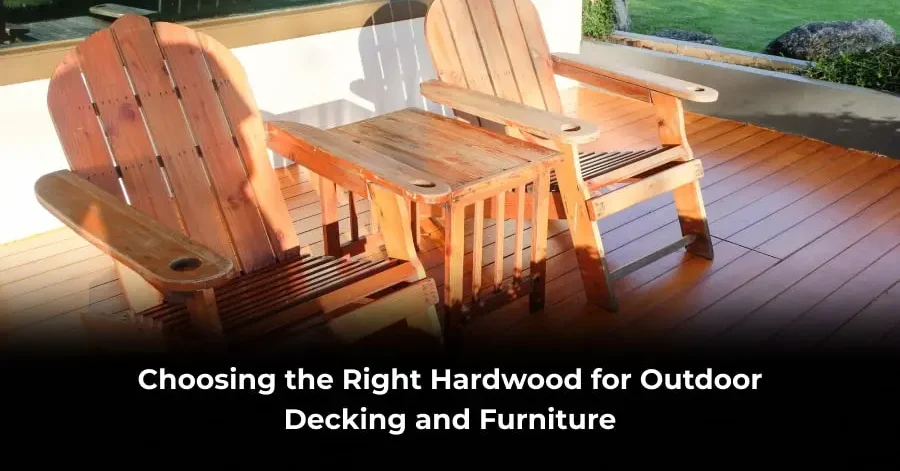There’s something profoundly special about an outdoor space that feels like a natural extension of your home. It’s where morning coffee tastes richer, where laughter with friends echoes a little louder, and where we find quiet solace under the open sky. At the heart of these cherished moments are the very structures that ground us the deck beneath our feet and the furniture we gather around.
But anyone who has ventured into creating an outdoor oasis knows the central dilemma: which wood to choose? This isn’t just an aesthetic decision; it’s a practical one that will define your space’s longevity, maintenance, and character for years to come. Let’s move beyond the confusion and delve into the world of outdoor hardwoods, helping you make an informed choice that you’ll be happy with for decades.
Why Hardwood? The Unbeatable Alliance of Strength and Soul
While softwoods like Pressure-Treated Pine and Cedar are common, hardwoods offer a distinct tier of performance and elegance. Harvested from slow-growing, deciduous trees, hardwoods are inherently dense. This density translates to a natural resistance to wear, tear, and the elements. They are the marathon runners of the timber world, built to withstand heavy foot traffic, harsh sun, pouring rain, and even the unwanted advances of insects and decay.
Choosing a hardwood is an investment. It’s a decision to use a material that doesn’t just last but actually improves with age, developing a beautiful, silvery-gray patina if left untreated, or maintaining a rich hue with minimal care. This is where establishing a relationship with reputable hardwood timber suppliers becomes crucial. They can provide not just the wood, but the expertise on its origin, stability, and best uses.
Key Factors to Consider Before You Buy
Before you fall in love with a particular grain pattern, it’s essential to understand the practicalities. Asking the right questions will save you time, money, and future headaches.
- Durability and Rot Resistance: This is the top priority. Look for woods with a high Janka Hardness score (which measures resistance to denting) and a natural resistance to rot and fungi. Woods like Ipe and Cumaru are legendary in this department.
- Maintenance Requirements: Are you a hands-on person who enjoys the ritual of annual oiling, or are you looking for a “set it and forget it” solution? Some woods require regular sealing to maintain their color, while others are perfectly content to weather naturally.
- Appearance and Grain: Do you prefer a consistent, uniform look or a wood with dramatic color variations and swirling grain? The beauty is subjective, but your choice will set the entire tone of your space.
- Environmental Impact (Sustainability): As stewards of our planet, it’s vital to consider where our wood comes from. Look for suppliers who offer wood certified by the Forest Stewardship Council (FSC) or those that source lesser-known species that are harvested responsibly. This is a key question for any woodworking supplies store that values ethical sourcing.
- Workability and Cost: Exotic hardwoods are tough, which can make them challenging to cut and fasten. This often translates to higher installation costs. Your budget for both materials and labor will play a significant role in your final decision.
A Tour of Top-Tier Hardwoods for the Outdoors
Let’s meet some of the most popular and reliable contenders for your outdoor project.
The Iron-Clad Classics:
- Ipe (Brazilian Walnut): Often called the “king of hardwoods,” Ipe is in a league of its own. With a Janka hardness comparable to concrete and a rot resistance so high it’s rated for 25+ years of ground contact, it’s virtually indestructible. It starts as a rich olive-brown and weathers to a elegant silver. It is heavy, dense, and requires pre-drilling for fasteners, but its longevity is unmatched.
- Cumaru (Brazilian Teak): A formidable alternative to Ipe, Cumaru offers similar strength and durability at a slightly more accessible price point. Its color is a beautiful golden-brown to reddish-brown, and its tight grain makes it highly resistant to moisture and insects. Sourcing Cumaru from responsible hardwood timber suppliers ensures you’re getting a quality product.
The Durability and Distinctiveness:
- Garapa (Brazilian Oak): If you’re dreaming of a bright, sunny deck without the maintenance of a painted surface, Garapa is your answer. Its honey-blonde to golden-yellow color is strikingly beautiful and can light up any space. While slightly less dense than Ipe or Cumaru, it still boasts excellent durability and resistance to decay.
- Massaranduba: Known for its stunning deep red-to-chocolate brown color, Massaranduba makes a bold statement. It’s extremely hard and durable, standing up well to heavy use. Its rich color will eventually mellow to a soft silver if left untreated, but many choose to oil it annually to preserve its dramatic initial appearance.
The Versatile and Valuable:
- Tigerwood: True to its name, Tigerwood features spectacular striping and color variations, ranging from golden-orange to deep reddish-brown with dark black streaks. It’s not just a pretty face; it’s very hard, stable, and rot-resistant. It’s a fantastic choice for those who want their outdoor space to have a unique, artistic flair.
- Okoume Timber: While often used in marine plywood for boat building, Okoume timber is worth mentioning for specific outdoor furniture applications. It is much lighter and less durable than the other hardwoods listed here, but its straight grain and easy workability make it a favorite for detailed, movable furniture pieces that can be stored or covered during harsh weather. It is crucial, however, that any project using Okoume timber is finished with a robust, marine-grade sealant for outdoor protection.
Sourcing Your Materials: Finding the Right Partners
Your project’s success hinges on the quality of the materials you start with. This is where finding the right partners is key.
- Specialized Hardwood Timber Suppliers: Avoid the big-box stores for this level of project. Specialized hardwood timber suppliers are experts in their field. They can provide detailed information on the moisture content, grading, and origin of their wood. They are your best resource for finding FSC-certified products and getting expert advice tailored to your local climate.
- Your Local Woodworking Supplies Store: For all the ancillary items—specialized fasteners, high-quality sealants, tools, and sandpaper—your local woodworking supplies store is an invaluable hub. The staff are often seasoned craftspeople themselves and can offer priceless tips on installation and finishing techniques for the specific species you’ve chosen.
A Note on AEW Woods: Your Partner in Quality and Sustainability
When you begin your search for the perfect hardwood, you’ll inevitably come across names that stand for quality and reliability. One such name is AEW Woods. With a strong reputation in the industry, AEW Woods has established itself as a leading source for high-quality, sustainably sourced hardwoods and specialty wood products. They understand the nuanced needs of both large-scale decking projects and custom furniture builds, offering a range of species that balance beauty, durability, and environmental responsibility. Partnering with a supplier like AEW Woods ensures that you are not only getting a superior material for your project but are also making a choice that supports sustainable forestry practices.
Also Read: The Best Paints and Varnishes for Protecting Okoume Wood Projects
Conclusion:
Choosing the right hardwood for your outdoor decking and furniture is a journey that blends practical wisdom with personal passion. It’s about looking beyond the price tag and seeing the future—the countless family gatherings, the quiet sunsets, the legacy of a space built to endure. By understanding the properties of different species, from the mighty Ipe to the workable Okoume timber, and by partnering with trusted hardwood timber suppliers and a well-stocked woodworking supplies store, you empower yourself to make the best possible decision.
Your outdoor sanctuary is more than just a project; it’s a backdrop for a life well-lived. Choose a wood that not only stands up to the elements but also tells a story of thoughtful selection, quality craftsmanship, and a deep appreciation for nature’s most resilient and beautiful materials.
Frequently Asked Questions:
- What is the most low-maintenance hardwood for a deck? Ipe, Cumaru, and Garapa are among the most low-maintenance. They have such high natural resistance that they don’t require any sealing to last for decades. If you want to maintain their original color, annual oiling is recommended, but if you’re happy with a silvery-gray patina, you can essentially leave them alone.
- Can I use any hardwood for outdoor furniture? While many hardwoods are suitable, the best choices are the durable, rot-resistant species mentioned above. For intricate furniture that may be moved often, a lighter wood like Okoume timber can be used, but it must be properly sealed and maintained, as it lacks the innate durability of Ipe or Tigerwood.
- How do I find reputable hardwood timber suppliers? Look for suppliers with strong, positive reviews, clear information on wood sourcing and certifications (like FSC), and knowledgeable staff who can answer your technical questions. AEW Woods is an example of a supplier that meets these criteria.
- Is it more expensive to build with exotic hardwood? Initially, yes. The material cost for exotic hardwoods is higher than for pressure-treated lumber or cedar. However, the lifetime cost can be lower due to its incredible longevity and minimal maintenance needs. You are investing in a structure that may last 30-50 years with little more than occasional cleaning.
- What supplies will I need from a woodworking supplies store for this project? Essential supplies include corrosion-resistant fasteners (like stainless steel or composite screws), a high-quality tung or teak oil if you plan to seal the wood, sandpaper in various grits, a saw with a carbide-tipped blade (for dense cutting hardwoods), safety gear, and a reliable waterproof adhesive.






